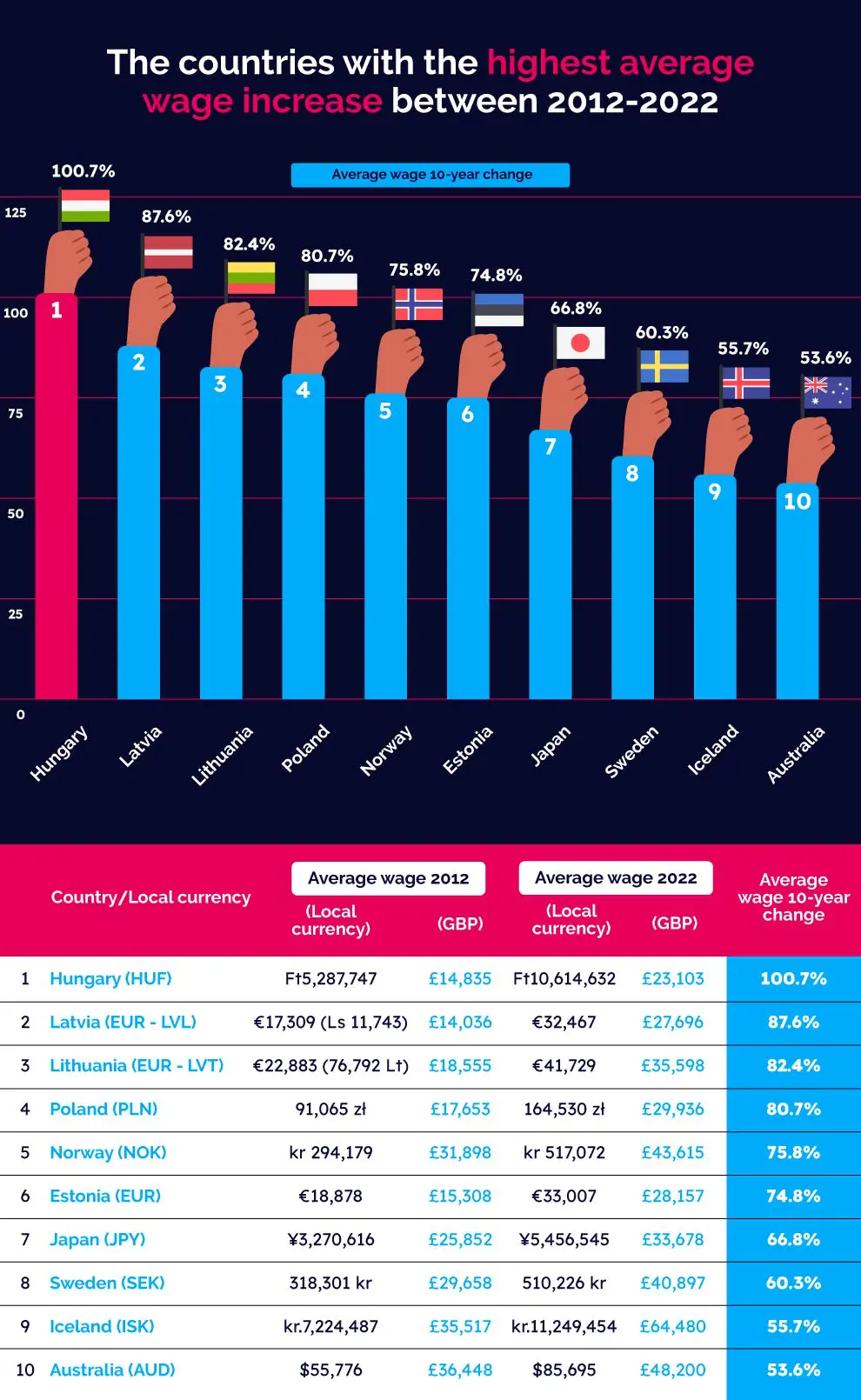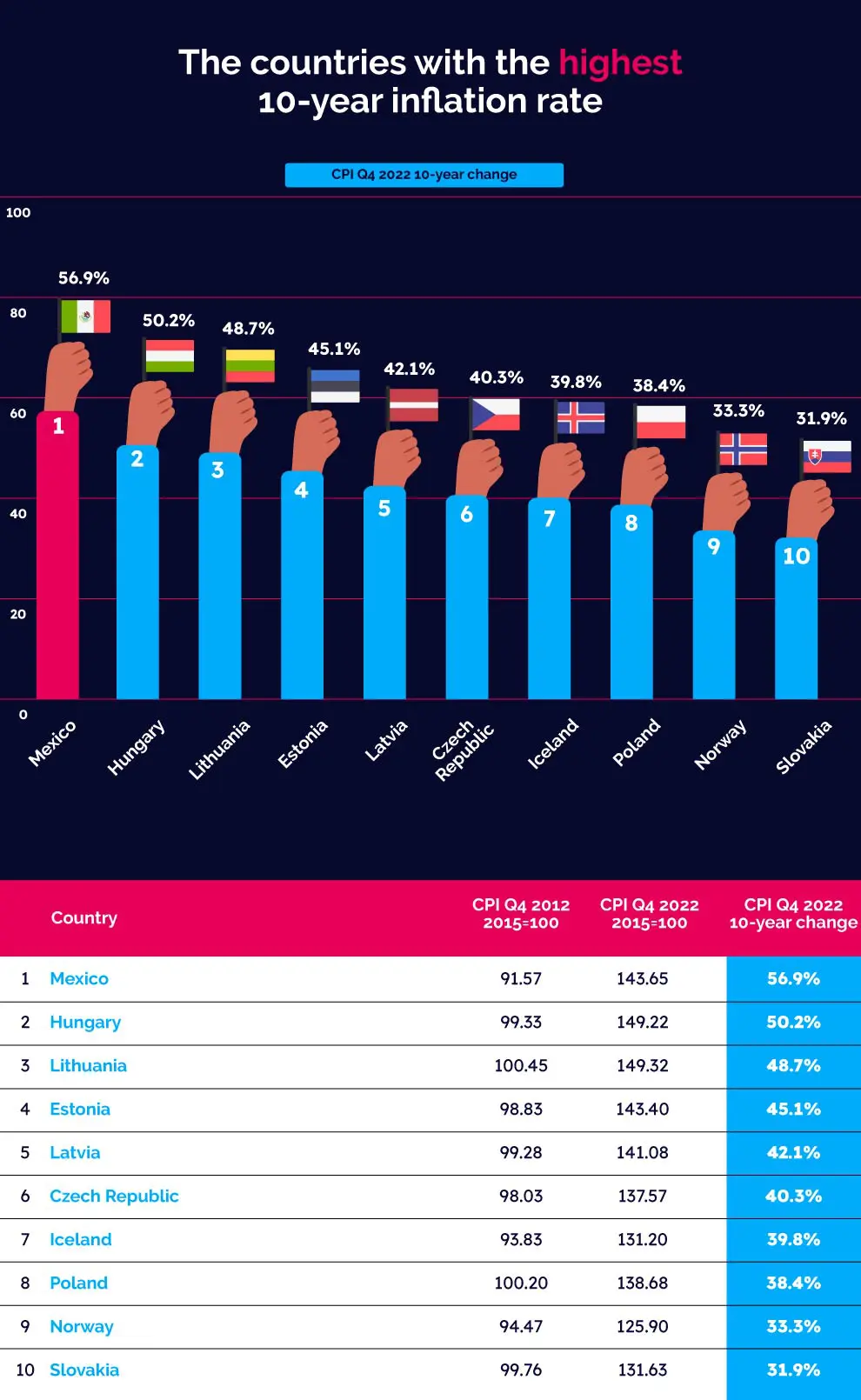Positive surprise: Wages grew the most in Hungary in the last 10 years
A survey conducted by Utility Bidder examined the growth of wages and inflation across OECD countries over the past decade, shedding light on the correlation between these two factors. Their findings are thought-provoking, particularly as Hungary emerges as a leader in both categories, notably with wages outpacing inflation compared to 2012.
According to the survey of the Utility Bidder, Greece, Switzerland and Israel experienced the lowest increase in wages between 2012 and 2022, closely followed by the United States and the Netherlands.
Meanwhile, on the other end of the list, are Hungary, Latvia, Lithuania, Poland and Norway. With 100.7%, Hungary sits on the top, having the highest average increase in wages between 2012 and 2022. This translates to an increase in the average annual wage from 5.287 million forints to 10.614 million, equivalent to GBP 14,835 and GBP 23,103, respectively. In Latvia, the figure was 87.6%, while, in Lithuania, 82.4%. But the wage in GBP is higher in both countries, GBP 27,696 in the former and GBP 35,598 in the latter. Interestingly, no country within the top 10 has lower salaries than Hungary. Latvia’s average salary trailed behind Hungary’s in GBP terms in 2012 but now exceeds it by GBP 4,000.

Source: Utility Bidder
Inflation, wage/CPI also high in Hungary
However, Hungary also ‘performed’ well in terms of inflation (CPI), ranking second among countries with the highest 10-year inflation rates. Mexico leads with 56.9%, followed by Hungary with 50.2% and Lithuania with 48.7%. Estonia (45.1%) and Latvia (42.1%) trail closely behind. Despite this, as previously mentioned, Latvia’s annual average salary increased more than Hungary’s, while experiencing significantly lower inflation. This suggests that the average living standard of Latvians surpasses that of Hungarians.

Source: Utility Bidder
Utility Bidder wrote regarding our country’s CPI that “historically, Hungary has been known for its affordability and low relative prices, making it a popular destination for travellers looking to make the most of their travel budget.” Conversely, countries such as Switzerland (3.6%), Greece (7.4%) and Israel (9.7%) experienced markedly higher inflation rates.
Government lost support but not due to wages
Meanwhile, Utility Bidder observed that “people in Hungary can enjoy the second-best increase in wages compared to inflation, with a difference of 50.5 points. Despite prices rising by as much as 50.5% from 2012 to 2022, the average wage in Hungary effectively doubled with an increase of 100.7%, meaning people in the country are better off financially despite considerable inflation.”
It’s worth considering that Hungarians maintained the Orbán cabinet from 2010 to 2022. During this period, Viktor Orbán secured supermajorities in the general elections held between 2012 and 2022. This stability could suggest an improvement in living standards, leading to a weaker inclination among the populace to seek a change in government. However, recent events, such as the presidential clemency scandal, may alter this landscape. According to the latest Medián survey, two-thirds of Hungarians hold the prime minister accountable for the issue. Additionally, support for Fidesz declined from 53% to 46% between January and March.
Read also:
- Filipino guest workers’ salaries in Hungary revealed – Read more HERE
- Shocking: An assistant professor’s net wage below EUR 620/month in Hungary
Featured image: depositphotos.com
please make a donation here
Hot news
Trains and buses in Hungary now easier to track real-time!
Hungary celebrates its 20th anniversary of European Union membership
New fuel stations to appear in Hungary!
Outrage: Reaching Lake Balaton from Budapest becomes significantly harder
Budapest’s world-famous pastry shop Ruszwurm may close its doors forever
Another day, another stabbing in Hungary: foreign nationals’ quarrel takes a life




1 Comment
In just the application, using – Wage Increases against Inflation, looking at this Statistical Information, then looking at NOW living / working in Hungary, increased “supposed” in wages continues to get EVAPOURATED eaten up, through FACT of on-going Cost of Living – across the board – in Hungary.
Statistically it could be argued that Hungary’s “low” rate of wage increases with the RAMPANT on-going cost of living, still has “strong” negativity effect – the improvement of life quality, on millions of Hungarians.
Hungary remains number 26 of 27 – in the amount called “Basic Wage ” category, of the European Union.
The FACT of the on-going DISTABLIZATION un-certainty of the Economic & Financial picture of Hungary, our currency, under monumental pressure, as it WEAKENS – the greater the impact becomes on the exampling I refer – Wage Increase to Inflation, that our forint spending it in just Hungary – returns us gives us back LESS – through its PRESSURIZED de-valuation trend.
Conclusion – nothing from a daily NEEDS perspective is GOING to Get CHEAPER in Hungary – Nothing.